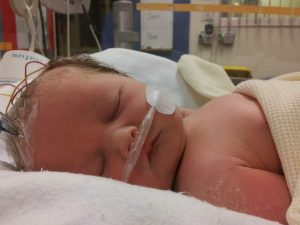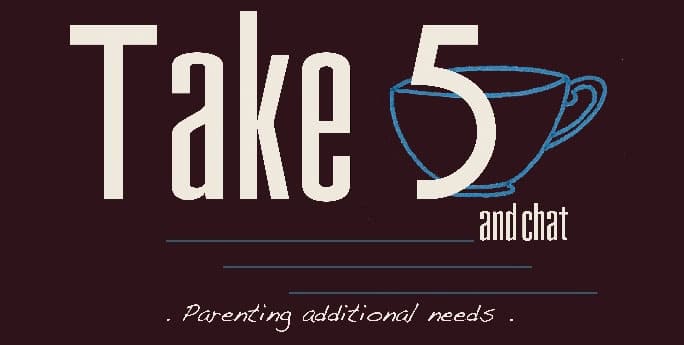Nearly five years ago, Rae wrote the birth story for her third child, Gideon. He was very poorly when he was born and spent time in NICU and SCBU. At that time, she didn’t really have any answers and didn’t know what the future might hold. Since then Gideon has been diagnosed with Prader-Willi Syndrome and life has taken the family on a very unexpected journey. Rae has written a mini series of blog posts for Take 5 and chat, and she raises some important issues and offers some helpful suggestions. Thanks Rae.

There’s a saying “Remove baby – insert guilt and worry”. It raises a smile because it’s so true. As parents we all worry – are they eating enough? Or too much? Shouldn’t they be rolling by now? Or crawling? Or walking? Or sleeping? And that’s just the immediate worries – what about schooling, and exams, and friends? How will they (or we!) afford University or to buy a house….
To an extent, this is what all parents do, and I don’t think we ever really stop. It’s a lifelong role. But having a child with special needs or a complex disability just increases that worry in innumerable ways. For me, it’s possibly the most debilitating and exhausting part. The constant broken nights obviously lead to physical tiredness, and everything always looks worse when you are exhausted. But in addition to this is the worry about The Future and what it may hold. I worry about how Gideon’s Prader-Willi Syndrome will develop. PWS is a spectrum disorder and there’s no way of knowing what aspects will most affect him. Will he get scoliosis and need braces and operations? Will his behaviour and anxieties deteriorate? What if we can’t cope? What if he needs residential schooling – does that mean we’ve failed as parents? And what about psychosis? How do we deal with that when it hits?
Unfortunately we’ve had to fight – lots – to get him as far as we have. He’s only four and we had a year-long battle to get him into the Special School we thought best suited his needs. It would be easy for me just to blame the Local Authority for this, but realistically I know the issue is far bigger – funding and resources for disability support in schools (both mainstream and specialised) is dire, and indicative of the value (or lack of) that society and the government but on those with SEND. Our current battle revolves around getting medical support for the diet we want to follow that we believe may be able to help Gideon’s hyperphagia (an abnormally great desire for food).
We worry about money – lots – whilst still recognising we are in a fortunate position compared to many. The fact remains that I’ve given up a well-paid job to be a full time carer. I just couldn’t juggle all the roles, and I wouldn’t have been able to fight for Gideon’s school place, for example, were I working. For now we are managing, but only just. I’ve forfeited my pension for example. I also get very anxious about the way the government seems intent on cutting support for those with complex needs – both direct payments and services that support them. The most frustrating thing is – I want to work! Part time and with a degree of flexibility, and I recognise I am not a natural full-time parent. Of course there are people who feel that Gideon, and those like him are nothing more than a drain on society. I know this, because they tell me. To my face.
We worry about Gideon’s future. As we get older, he won’t get more independent. It’s unlikely that he will ever live without intensive support. But finding somewhere suitable, that really understand his complex needs, and then getting funding isn’t going to be easy. And yet, I don’t want his brothers feeling responsible for him either.
So yes, I worry too about the impact on his older brothers. They are Young Carers. Looking after Gideon has an incalculable impact on them in myriad different ways and I do worry about the responsibility they may face.
So now, when you ask me how I am, and I smile and say “Oh, you know – fine, but tired” you have an idea of exactly what it is that I find so exhausting.

Remember the positives of ‘surrounding yourself with people who get it’ and build a group of friends who you can talk to. There will always be another parent who has been there, or almost there, before you! Thanks Rae for your openness and honesty – we get it!
Prader-Willi syndrome (PWS) was first described in 1956 by Swiss doctors, Prof. A Prader, Dr A Labhart and Dr H Willi, who recognised the condition as having unique and clearly definable features. These features are, as medically described:
- Hypotonia: weak muscle tone, and floppiness at birth.
- Hypogonadism: immature development of sexual organs and other sexual characteristics.
- Obesity: caused by excessive appetite and overeating (hyperphagia), and a decreased calorific requirement owing to low energy expenditure levels. (Obesity is not normally a feature of those whose food intake is strictly controlled.)
- Central nervous system and endocrine gland dysfunction: causing varying degrees of learning disability, short stature, hyperphagia, somnolence (excessive sleepiness), and poor emotional and social development.



